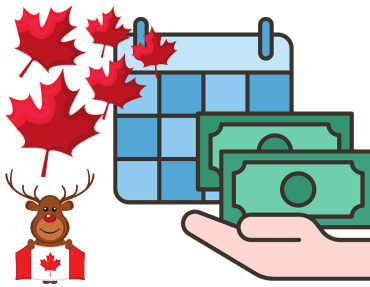Welcome to this overview of navigating minimum wage in Prince Edward Island. As a journalist, it is important to inform and inspire curiosity in readers, particularly when it comes to issues that affect workers’ rights. In this article, we will delve into the current minimum wage in Prince Edward Island, who is eligible for it, any exceptions to the requirements, and how it compares to other provinces and territories. We will also explore the process for reporting minimum wage violations and why fair wages are crucial for all workers. Whether you are a resident of Prince Edward Island or simply interested in labour laws, this overview will provide valuable insights.
Introduction to Prince Edward Island Minimum Wage
Prince Edward Island (PEI) is one of Canada’s smallest provinces, both in terms of land area and population. Despite its size, the province has a thriving economy with various industries ranging from agriculture, fishing, tourism to technology. However, not all workers in PEI receive fair wages for their labour. This is where minimum wage laws come into play. The minimum wage is the lowest amount that an employer can pay their employees per hour of work. It is set by the government to ensure that workers receive a decent income and do not fall below the poverty line. In PEI, the minimum wage is reviewed annually by the Employment Standards Board and adjusted according to changes in the cost of living. The minimum wage applies to all workers who are 18 years or older, except for those who are exempted by law. It is important to note that the minimum wage is not a living wage and may not be enough for some workers to support themselves and their families. In this article, we will explore the current minimum wage in PEI, who is eligible for it, any exceptions to the law, how it compares to other provinces and territories, and the process for reporting violations.
What is the Current Minimum Wage in Prince Edward Island?
As of April 1, 2021, the current minimum wage in Prince Edward Island is $13.25 per hour. This rate applies to most employees who work on an hourly basis. However, it is important to note that some workers may be eligible for a lower minimum wage if they fall under certain categories, such as liquor servers or inexperienced employees. The minimum wage for liquor servers is $12.85 per hour, while inexperienced employees who have less than three months of continuous employment with their current employer can be paid a rate of $12.50 per hour. It is also worth mentioning that there are different minimum wage rates for certain industries, such as agriculture and fishing. These rates vary depending on the type of work being done and the age of the employee. It is important for employers to ensure that they are paying their employees the correct minimum wage based on their job category and industry. Failure to do so can result in penalties and legal action. Overall, while the current minimum wage in Prince Edward Island is not the highest in Canada, it is still an important baseline for ensuring fair compensation for all workers in the province.
Who is Eligible for Minimum Wage in Prince Edward Island?
In Prince Edward Island, minimum wage legislation applies to most employees who are 18 years or older. However, there are some exceptions to this rule. For instance, students under the age of 18 who work part-time may be paid a lower minimum wage rate. Additionally, individuals who work in certain industries such as agriculture, fishing, and forestry may also be subject to different minimum wage rates or exemptions. It is important to note that individuals who are self-employed or work as independent contractors are not covered by minimum wage legislation. Furthermore, some employees may be exempt from minimum wage requirements if they are covered by a collective agreement or if they work in a specialized field that is regulated by another government agency. Overall, it is crucial for employers to understand the eligibility criteria for minimum wage and ensure that all eligible employees are paid at least the minimum wage rate set by the government. Failure to comply with minimum wage legislation can result in penalties and legal action against employers, so it is important for both employees and employers to be aware of their rights and responsibilities regarding minimum wage in Prince Edward Island.
What are the Exceptions to Minimum Wage Requirements in Prince Edward Island?
While most workers in Prince Edward Island are entitled to receive minimum wage, there are some exceptions to this rule. These exceptions include those who work in industries such as agriculture, fishing, and aquaculture. For example, employees who work in the agriculture industry may be paid according to a piecework rate rather than hourly wage, provided that their total earnings still meet or exceed the minimum wage requirements. Additionally, those who work in certain professions, such as real estate agents or commission-based salespeople, may also be exempt from minimum wage requirements.
Another exception to minimum wage requirements is for workers who are under the age of 18 and have less than three months of continuous employment with their current employer. These workers may be paid a lower minimum wage rate that is adjusted for their age and experience level.
It’s important to note that while these exceptions exist, employers must still comply with other employment standards legislation such as providing safe working conditions and ensuring that employees are not subject to discriminatory practices. Any violations of minimum wage requirements or other employment standards can be reported to the Employment Standards Office for investigation.
Overall, while there are some exceptions to minimum wage requirements in Prince Edward Island, it’s important for employers to ensure that all workers are being paid fairly and equitably for their labour. Workers should be aware of their rights and entitlements under the law and speak up if they believe they are being treated unfairly.
How Does the Minimum Wage Compare to Other Provinces and Territories?
In Prince Edward Island, the minimum wage is currently set at $12.95 per hour, which is the highest minimum wage rate in Atlantic Canada. However, when compared to other provinces and territories in Canada, it falls in the middle range. As of April 2021, Nunavut has the highest minimum wage rate at $16.00 per hour, followed by the Northwest Territories at $15.20 per hour and Yukon at $15.20 per hour. On the other hand, Saskatchewan has the lowest minimum wage rate at $11.81 per hour, followed by Quebec at $13.50 per hour and Alberta at $15.00 per hour. It’s worth noting that some provinces and territories have different minimum wage rates for different types of workers, such as liquor servers or students.
When it comes to comparing minimum wages across different regions, it’s important to take into account factors such as the cost of living and inflation rates. In Prince Edward Island, the cost of living is relatively lower than in larger cities such as Toronto or Vancouver, which means that a lower minimum wage can still provide a decent standard of living. However, it’s also important to ensure that workers are being paid fairly for their labour and that they are able to support themselves and their families without struggling to make ends meet.
What is the Process for Reporting Minimum Wage Violations in Prince Edward Island?
If an employee believes that their employer is not paying them the minimum wage required by law in Prince Edward Island, they can report the violation to the Employment Standards Office. This office is responsible for enforcing minimum wage laws and other labour standards in the province. Employees can file a complaint with the office either online, by mail, or in person. The complaint should include details about the violation, such as the date and time it occurred, the amount of wages owed, and any evidence that supports the claim. Once the complaint is received, an officer from the Employment Standards Office will investigate the matter. The officer may interview both the employer and employee, review payroll records, and gather other evidence to determine whether a violation has occurred. If a violation is found, the employer may be required to pay back wages owed to the employee. In some cases, employers may also face fines or other penalties for violating minimum wage laws. It’s important for employees to understand their rights under minimum wage laws and to report any violations promptly. By doing so, they can help ensure that all workers in Prince Edward Island receive fair wages for their work.
Conclusion: The Importance of Fair Wages for All Workers
In conclusion, fair wages are crucial for all workers in Prince Edward Island and beyond. Workers deserve to be paid a wage that is commensurate with their skills, experience, and contributions to their employer’s success. When workers are paid fairly, they are more likely to be productive, motivated, and engaged in their work. Fair wages also help to reduce poverty, inequality, and social exclusion, which can have a range of negative effects on individuals, families, and communities. Moreover, fair wages can help to stimulate economic growth by increasing consumer spending and reducing the burden on social welfare programs. Employers who pay fair wages are also more likely to attract and retain high-quality employees, which can improve the overall performance and reputation of their business. Finally, fair wages are not only a matter of justice and human dignity but also a legal requirement in Prince Edward Island. Employers who fail to comply with minimum wage laws can face penalties, fines, and legal action. In short, fair wages are essential for promoting social justice, economic prosperity, and human well-being in Prince Edward Island and beyond.
As we come to the end of this overview on navigating minimum wage in Prince Edward Island, it is clear that fair wages are essential for all workers. The current minimum wage in PEI, eligibility criteria, and exceptions to minimum wage requirements have been discussed, along with a comparison of PEI’s minimum wage to other provinces and territories. Additionally, the process for reporting minimum wage violations has been outlined. It is important for workers to be aware of their rights and for employers to comply with the law. However, as we reflect on this topic, we must also consider the broader issues of income inequality and poverty in our society. While minimum wage laws can provide some protection for workers, they do not address the root causes of these issues. It is up to all of us to work towards a more just and equitable society where all workers receive fair compensation for their labour.
Minimum wage?
Alberta, British Columbia, Manitoba, New Brunswick, Newfoundland and Labrador, Nova Scotia, Ontario, Prince Edward Island, Quebec, Saskatchewan






Pingback: What is Saskatchewan minimum wage? – Things to do in Canada
Pingback: What is Alberta minimum wage? – Things to do in Canada